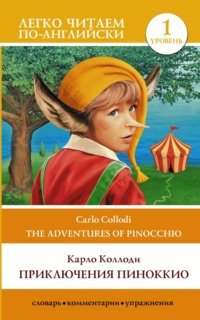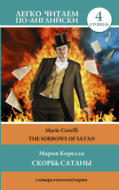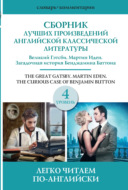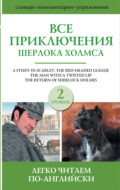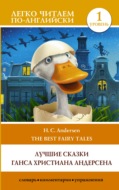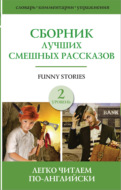Kitobni o'qish: «Приключения Пиноккио / The adventures of Pinocchio. Уровень 1»
Carlo Collodi
The adventures of Pinocchio
© Матвеев С.А., адаптация текста, комментарии и словарь
© ООО «Издательство, АСТ», 2021
Carlo Collodi
The Adventures of Pinocchio
Chapter 1
Master Cherry found a piece of wood that wept and laughed like a child
Centuries ago there lived-
“A king!” my little readers will say immediately.
No, children, you are wrong. It was a piece of wood. It was not an expensive piece of wood. Far from it. Just a common block of firewood that can make cold rooms cozy and warm.
I do not know how this really happened, but one fine day this piece of wood found itself in the shop1 of an old carpenter. His real name was Master Antonio, but everyone called him Master Cherry. The tip of his nose was so round and red and shiny that it looked like a ripe cherry.
As soon as he saw that piece of wood, Master Cherry enjoyed it. He mumbled to himself happily:
“Very well. I shall use it to make the leg of a table.”
He grasped the hatchet quickly to peel off the bark2 and shape the wood. But suddenly he heard a wee, little voice:
“Please be careful! Do not hit me so hard!”
Master Cherry was very surprised! He turned frightened eyes about the room to find out where that wee, little voice came from. And he saw no one! He looked under the bench-no one! He peeped inside the closet-no one! He searched among the shavings-no one! He opened the door-and still no one!
“Oh, I see!” he then said. “It is a hallucination! Well, well-to work once more.”
He tried to cut the piece of wood.
“Oh, oh! You hurt!” cried the same little voice.
Master Cherry was dumb. His eyes popped out of his head, his mouth opened wide, and his tongue hung down on his chin. Then he said:
“Where did that voice come from? There is no one around. Maybe this piece of wood can weep and cry like a child. I can hardly believe it. Here it is-a piece of firewood, the same as any other. Yet someone is in it. I’ll find him!”
With these words, he grabbed the log with both hands and started to beat it unmercifully. He threw it to the floor, against the walls of the room, and even up to the ceiling.
Where is the tiny voice? He waited two minutes-nothing; five minutes-nothing; ten minutes-nothing.
“Oh, I see,” he said. “It is just a hallucination! Well, well-to work once more.”
He picked up the plane3 to make the wood smooth and even. But as he drew it to and fro4, he heard the same tiny voice. This time it giggled:
“Stop it! Oh, stop it! Ha, ha, ha! You tickle my stomach.”
This time poor Master Cherry fell down on the floor.
Chapter 2
Master Cherry gives the piece of wood to his friend Geppetto
In that very instant, a loud knock sounded on the door.
“Come in,” said the carpenter.
The door opened and a dapper little old man came in. His name was Geppetto, but to the boys of the neighborhood he was Polendina (Cornmeal mush)5, because his wig was just the color of yellow corn.
Geppetto had a very bad temper. He hated that name, Polendina. He became as wild as a beast easily.
“Good day, Master Antonio,” said Geppetto. “What are you doing on the floor?”
“I am teaching the ants their ABC’s.”
“Good luck to you!”
“What brought you here, friend Geppetto?”
“My legs. Master Antonio, I want to beg for a favor6.”
“I am at your service,” answered the carpenter, and raised himself on to his knees.
“This morning a fine idea came to me.”
“Let’s hear it.”
“I want to make myself a beautiful wooden Marionette. It will be able to dance, fence, and turn somersaults7. With it I intend to go around the world, to earn my bread. What do you think of it?”
“Bravo, Polendina!” cried the same tiny voice.
Master Geppetto was red and said to the carpenter angrily:
“Why do you insult me?”
“Who? I don’t.”
“You called me Polendina.”
“I did not.”
“I know it was you.”
“No!”
“Yes!”
“No!”
“Yes!”
And finally they began to fight. When the fight was over, Master Antonio took Geppetto’s yellow wig and Geppetto found the carpenter’s curly wig in his mouth.
“Give me back my wig!” shouted Master Antonio.
“You return mine and we’ll be friends.”
The two little old men shook hands and swore to be good friends for the rest of their lives.
“Well then, Master Geppetto,” said the carpenter, “what is it you want?”
Bepul matn qismi tugad.
